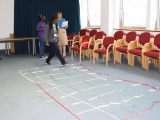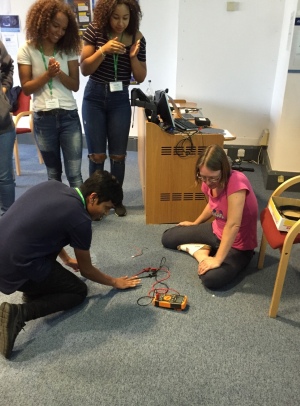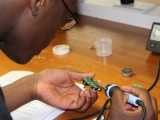Sutton Trust students have brilliant week in Electrical Engineering
by Kay Hancox

Last week, the Department took part in the Year 12 Sutton Trust Summer School with thirteen students joining us as part of the course.
Electrical and electronic engineering is not just fixing things and is not just for boys. It has a wide range of applications from medicine to aircraft and can be applied to a range of worldwide problems. This was the discovery of the 7 young women and 6 young men who spent 4-days with the Department as part Imperial College’s Sutton Trust summer school.
The purpose of the week was to allow students to experience the exciting world of research, and as the course was residential it allowed the students to gain a flavour of real university life. The Departments of Chemistry, Biomedical Science, Physics, Chemistry, Mathematics and Computing also ran streams so there were 100 students on campus.
Kay Hancox, Outreach and Recruitment Manager, put together a varied programme for the students which included visiting our research, talks and creative activities, including two fun icebreaker activities on the first afternoon for so people could to get to know each other.
One of the highlights of the week for the students was a morning spent with a research group. The students were paired up to visit different groups. They spent their time talking to professors, lecturers, research assistants, and PhD students about their work, and saw research in progress. The students found out about our research into converting dc to ac to carry power generated by offshore wind farms to land, the development of medical imaging cameras to investigate liver fluke disease in Thailand, and a range of other topics. During the remainder of the week they attended talks on a wide range of topics.
Their first talk was with Dr Krystian Mikolajczyk who introduced them to work on image recognition and the difficulties computers have in distinguishing a person from a car. Krystian used movies such as Minority Report and Terminator to illustrate how what was science fiction 15 years ago is reality today.
Our Director of Undergraduate Studies, Dr Kristel Fobelets talked to the students about how her research interest in field effect transistors and how her research connects with student projects on our undergraduate courses, including a cycle helmet which uses the kinetic energy of the cyclist to power lights in the helmet, and solar cell thermoelectrics. Kristel had bought along a range of projects which the students got to handle. Dr Oleksiy Sydoruk told students about the RFIDs that make their Oyster cards work. Dr Tim Constandinou talked to the students about how microchips are being developed that can be implanted in the brain to assist people with severe epilepsy by controlling brain oscillations. This led to many questions about how widespread chip implants were likely to become for people with other conditions such as Tourette’s Syndrome, and a discussion about cochlear implants.

Dr Fobelets demonstrates a student project
We got a couple of our PhD students involved: the students spent time with Bulat Khusainov of the Control and Power group, who with the aid of a model crane allowed the students to see why automatic control of cranes is better than manual control. Another PhD student Himadri Das spoke to the students about his research into powertrain control for automotive systems.
The students also got essential hands on experience with us by building a Decision Maker, an electrical device which gauges passion by measuring electrical conductivity in the fingers and helps make decisions.

There were a number of activities aimed at preparing the students for university including a talk on personal statements and one on electrical and electronic engineering degrees.In the evenings the students joined those on the other streams and took part in a variety of games designed to develop creativity and resilience. On Thursday evening there was a formal dinner which was attended by representatives of the Sutton Trust. Dr Ellie Decamp of the Sutton Trust gave a short speech about the Trust’ work which the students found very inspiring.
On the final day the students re-joined those from the other streams and produced posters about their experience. In the afternoon there was a poster session where they presented these posters to the other students, their families and Imperial staff on their week. Anna and Katia’s poster won third prize. This was based around their discussions with Henna Kamel, a PhD student in the Optical and Semiconductor Devices research group, on her work on bowel rings. They said that they had found this turely inspiring. The whole room during the poster session was absolutely buzzing with excitement and the feeling that everyone was now university-ready.

Anna and Katya with their poster
Thank you to all the staff and students in the Department of Electrical and Electronic Engineering who made the week so successful. Also thanks to Delores and Piers, two EEE students who looked after the students during the day.
Find out more about the Sutton Trust who sponsored the Summer School here.
Article text (excluding photos or graphics) © Imperial College London.
Photos and graphics subject to third party copyright used with permission or © Imperial College London.
Reporter
Kay Hancox
Department of Electrical and Electronic Engineering